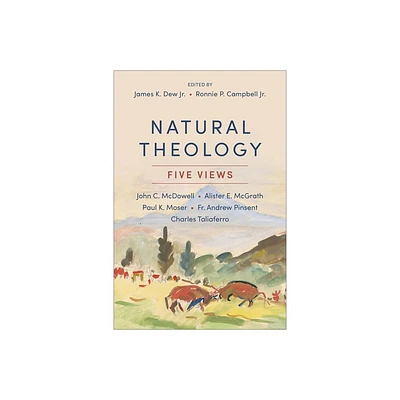Home
Christianity and Classical Culture: The Metamorphosis of Natural Theology in the Christian Encounter with Hellenism
Loading Inventory...
Barnes and Noble
Christianity and Classical Culture: The Metamorphosis of Natural Theology in the Christian Encounter with Hellenism
Current price: $48.00


Barnes and Noble
Christianity and Classical Culture: The Metamorphosis of Natural Theology in the Christian Encounter with Hellenism
Current price: $48.00
Loading Inventory...
Size: OS
*Product Information may vary - to confirm product availability, pricing, and additional information please contact Barnes and Noble
The momentous encounter between Christian thought and Greek philosophy reached a high point in fourth-century Byzantium, and the principal actors were four Greek-speaking Christian thinkers whose collective influence on the Eastern Church was comparable to that of Augustine on Western Latin Christendom. In this erudite and informative book, a distinguished scholar provides the first coherent account of the lives and writings of these so-called Cappadocians (named for a region in what is now eastern Turkey), showing how they managed to be Greek and Christian at the same time.
Jaroslav Pelikan describes the four Cappadocians—Gregory of Nazianzus, Basil of Caesarea, Gregory of Nyssa, and Macrina, sister and teacher of the last two—who were trained in Classical culture, philosophy, and rhetoric but who were also defenders and expositors of Christian orthodoxy. On one issue of faith and life after another—the nature of religious language, the ways of knowing, the existence of God, the universe as cosmos, time, and space, free will and immortality, the nature of the good life, the purpose of the universe—they challenged and debated the validity of the Greek philosophical tradition in interpreting Scripture. Because the way they resolved these issues became the very definition of normative Christian belief, says Pelikan, their system is still a key to our understanding not only of Christianity's diverse religious traditions but also of its intellectual and philosophical traditions.
This book is based on the prestigious Gifford Lectures, presented by Jaroslav Pelikan at the University of Aberdeen in 1992 and 1993.
Jaroslav Pelikan describes the four Cappadocians—Gregory of Nazianzus, Basil of Caesarea, Gregory of Nyssa, and Macrina, sister and teacher of the last two—who were trained in Classical culture, philosophy, and rhetoric but who were also defenders and expositors of Christian orthodoxy. On one issue of faith and life after another—the nature of religious language, the ways of knowing, the existence of God, the universe as cosmos, time, and space, free will and immortality, the nature of the good life, the purpose of the universe—they challenged and debated the validity of the Greek philosophical tradition in interpreting Scripture. Because the way they resolved these issues became the very definition of normative Christian belief, says Pelikan, their system is still a key to our understanding not only of Christianity's diverse religious traditions but also of its intellectual and philosophical traditions.
This book is based on the prestigious Gifford Lectures, presented by Jaroslav Pelikan at the University of Aberdeen in 1992 and 1993.


















